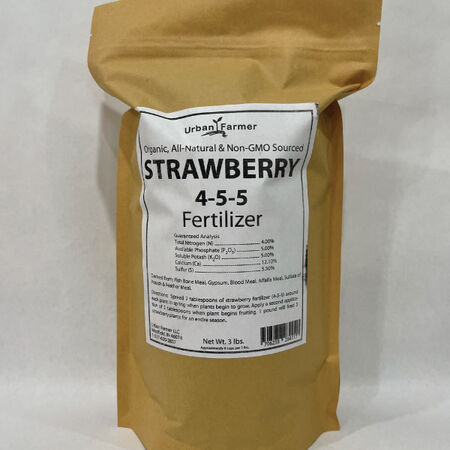Organic Strawberry Fertilizer, Fertilizers
Organic, All-Natural & Non-GMO Sourced Strawberry Fertilizer (4-5-5).
The Urban Farmer Strawberry Fertilizer is guaranteed to increase yields, size, health and vigor of your strawberry plants. This 4-5-5 (NPK) fertilizer ratio provides the Nitrogen your strawberries need in the spring and the Phosphate and Potash to produce high yields of large fruits in the summer. The fertilizer also contains several other beneficial vitamins, minerals and microbes for plant and soil health.
Directions: Spread 2 tablespoons of strawberry fertilizer (4-5-5) around each plant in spring when plants begin to show signs of growth. Apply a second application of 2 tablespoons when plant begins to fruit. 1 lb. will feed 5 strawberry plants for an entire season.
How much strawberry fertilizer do I need? 15 Strawberry Plants: 3 lbs 30 Strawberry Plants: 6 lbs 120 Strawberry Plants: 24 lbs
Derived from: Fish Bone Meal, Gypsum, Blood Meal, Alfalfa Meal, Sulfate of Potash & Feather Meal. Guaranteed Analysis: Total Nitrogen (N) ..................... 4.00% Available Phosphate (P2O5)..... 5.00% Soluble Potash (K2O) ............... 5.00% Calcium (Ca) ............................. 12.10%
Product Details
Weight
3Depth
9Height
3Width
6Components
Growing Instructions
Shipping Schedule
Our Seed Promise
 "Agriculture and seeds" provide the basis upon which our lives depend. We must protect this foundation as a safe and genetically stable source for future generations. For the benefit of all farmers, gardeners and consumers who want an alternative, we pledge that we do not knowingly buy or sell genetically engineered seeds or plants.
"Agriculture and seeds" provide the basis upon which our lives depend. We must protect this foundation as a safe and genetically stable source for future generations. For the benefit of all farmers, gardeners and consumers who want an alternative, we pledge that we do not knowingly buy or sell genetically engineered seeds or plants.
The mechanical transfer of genetic material outside of natural reproductive methods and between genera, families or kingdoms, poses great biological risks as well as economic, political, and cultural threats. We feel that genetically engineered varieties have been insufficiently tested prior to public release. More research and testing is necessary to further assess the potential risks of genetically engineered seeds. Further, we wish to support agricultural progress that leads to healthier soils, to genetically diverse agricultural ecosystems, and ultimately to healthy people and communities.
To learn more about the "Safe Seed Pledge" please visit www.councilforresponsiblegenetics.org.

